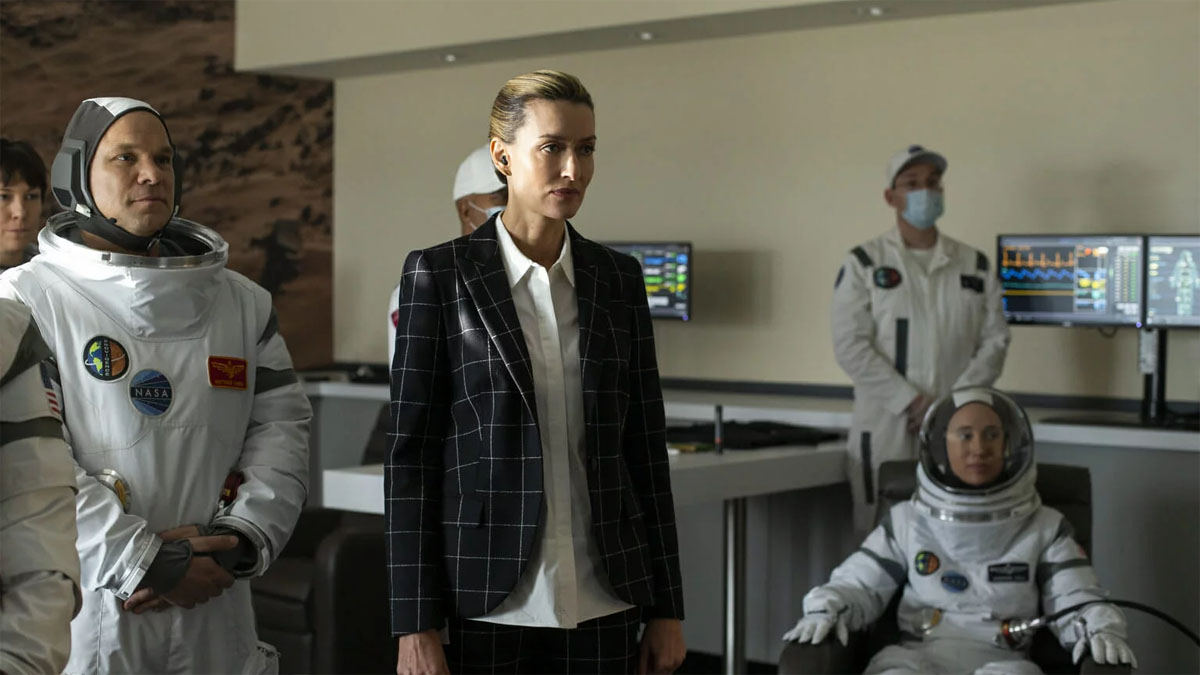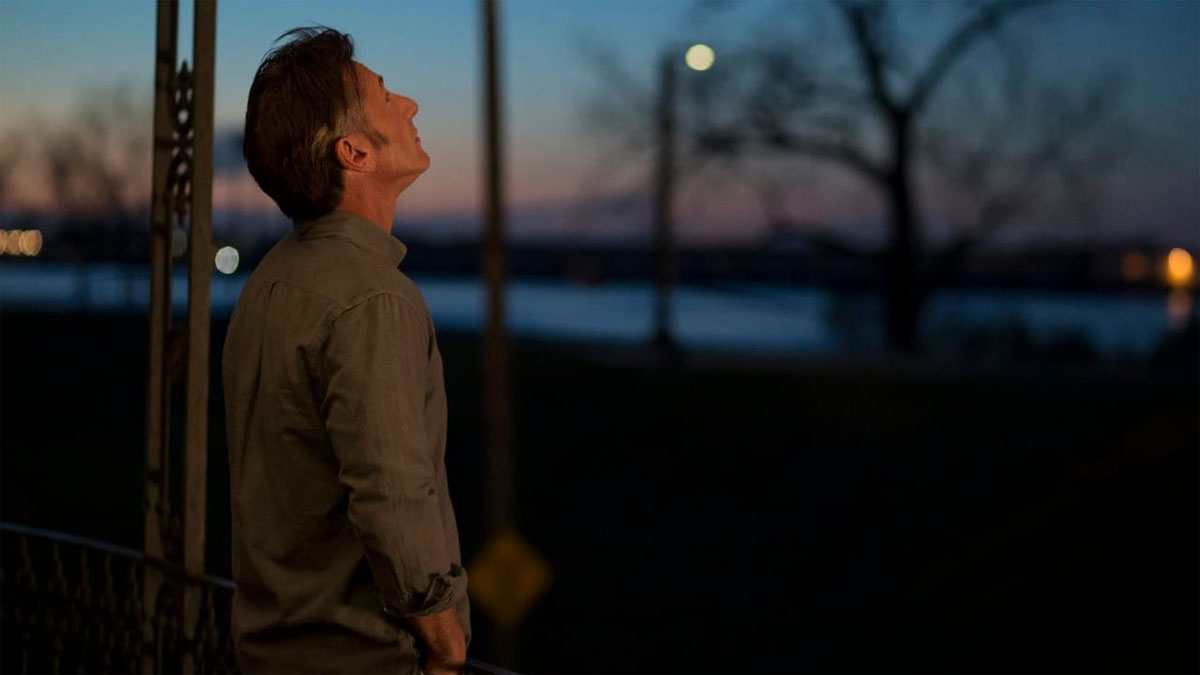The First interview: “it’s a human show, more than anything”
Showrunner Beau Willimon and actor Natascha McElhone chat to us about space travel drama The First, starting tonight on Channel 4…
When writer-producer Beau Willimon was four years old, he was taken to see his dad’s workplace. The visit left such an impression on Willimon that he credits it with seeding a passion expressed thirty-five years later in his new space travel drama The First.
Beau Willimon’s dad wasn’t an astronaut; he was chief engineer on a nuclear submarine. “It felt like a rocket built to go underwater,” Willimon reminisced to the crowd at The First press screening. “He would go on tour for months at a time and we had no contact with him. I’d draw cross-sections of that submarine, wondering where in the world he was. That instilled a passion for stories about people on journeys, having adventures and pushing the limits.”
The First, set thirteen years in the future around the launch of the inaugural human mission to Mars, is a story about all those things. Starring Sean Penn and Natascha McElhone, it’s a serious, slow-build emotional drama set against a backdrop that requires a budget and scope in evidence in episode one.
We chatted to the former House Of Cards showrunner and The First actor McElhone, who plays private space exploration CEO Laz Ingram, about what viewers can expect…
Would you say The First is an astronaut show rather than a space show?
Beau Willimon: It’s a human show, more than anything. The show is about the first human mission to Mars but with an emphasis on the human. We do spend quite a bit of time focusing on astronauts but not just the astronauts, also Natascha’s character Laz Ingram, who’s the visionary behind all of this. Other members of the ground team, engineers, scientists and so on, and then of course the loved ones of all these people.
When people think ‘Mars’ in sci-fi, they might think extra-terrestrials, but with The First, would you say they’re more likely to come across existential crises?
BW: [Laughs] Yeah. In order to embark on a mission like this requires a formidable amount of sacrifice, of contending with the emotional and psychological costs of it and so I think that’s really where the heart of the show is and really, the bulk of the first season is here on Earth, trying to get to the starting line. We wanted to dramatise just how difficult it is to even get to that launch. That’s really where our focus is.
You talked at the press launch about the show “delivering on its Mars candy”
[Laughter]
BW: That was the alternative name for the show: Mars Candy! But we settled on The First.
Is that something you’ll be working towards on season two, if you get there?
BW: Sure. I was being a bit facetious. I don’t want to belittle the Mars aspect of it. The reason I was referring to it in that way, I believe I was talking about one way that we could have structured the show is to get straight to the surface of Mars within an episode or two, but had we done that we wouldn’t have had the opportunity to really see how hard it is just to even get to a launch and be as invested in the characters.
Certainly, the whole point of this mission is to get to the surface of Mars and therefore in the telling of that story, our whole point is also to get to the surface of Mars. We just want to earn it. We don’t want it to be easy, and we want to see as many steps along the way as we can fit in to the story.
Season one is mostly Earth-bound. We see plenty of preparation and training and the hoops that Laz has to jump through, the costs on the families and loved ones. We’re always reminding people of what we’re trying to get through and seeing little slivers and snippets of Mars along the way. It’s not unreasonable to think, after this first season, now that we have our astronauts on their way that if we’re lucky enough to keep making the show that we will see them make it to Mars. By the time we get there, we really will have felt like it was a true journey. Space exploration doesn’t happen overnight. By the time we get to Mars, we want the audience to have the same sort of euphoria as billions of people across the world will when it happens in real life.
When you and Natascha first spoke about the character of Laz Ingram, you said there were things that you specifically didn’t want her to be – what were they?
BW: Just from a writing perspective, she’s a bit of a different animal than a lot of other characters. Whereas a lot of the other characters in many ways are ordinary and relatable because their lives are similar to our own, they’re ordinary people trying to do an extraordinary thing – she’s an extraordinary person whose life might not seem quite as ordinary as the average person’s and yet she must contend with all the ordinary things that life throws at her.
NM: Her thinking in a sort of macro, cosmic way is not a challenge for her, it’s something that perhaps she even did as a child, to be tuned in to a kind of different stratosphere than your average kid, but therefore what’s challenging for her is perhaps the nuance and minutiae of dealing with day-to-day problems – people, petty politics, that sort of thing. She has less skill in that.
The super-rich are not normal people, right?
NM: I hear you [laughs]
BW: Though interestingly, one of the things Natascha and I talked about quite early on is that Laz Ingram is not really all that interested in money, in personal wealth. She is wealthy as a by-product of the work she’s done, and she’s interested in raising money for the mission, but she doesn’t gauge her value by a bottom line of dollars and cents or pounds and pence.

NM: The money in her life is around efficiency and how she can best make use of her time to achieve what they’re trying to achieve. She has this ergonomic house that just functions incredibly efficiently. Of course, it’s aesthetically beautiful, but I’d say that the clothes, all that sort of thing, it’s quite perfunctory. I don’t think she’d spend very much time online shopping.
BW: She does what she has to do to present a certain version of herself to the world that exudes confidence and leadership. There’s a certain amount of salesmanship that goes along with it.
NM: That you’d want to invest in.
BW: But interestingly with a lot of the other characters, we spend quite a bit of time with their homelives and their pasts. What we’re trying to do with each character is present their own life through their own perspective and what’s important to them. So in terms of what we didn’t want her to be, we didn’t want to reduce her to ‘she goes to work and now she comes home and we’re going to do all the homelife stuff’. We see bits and pieces of her personal life, but because her personal life, to her, is not as important as the work she’s doing, in many ways, her work is her personal life. We took a different approach, which I think is novel and interesting.
There’s a lot of contrast in the first episode between the really small trivial, banal things—fixing a tap and picking up dog mess—and the huge scale of Mars, space travel, human ambition… Moving between those two scales, did that help you tell the story you wanted to tell?
BW: It is a show where cleaning up a dog’s mess and the launch of a rocket exist side by side. I think that’s life. On the one hand you might be cutting your toenails one morning, you’re rushing on the way to work and later that day learn that someone very close to you has passed away. Toenail clippings and death in a family are the human experience. They go hand-in-hand. That’s no different than in a trip to Mars.
One of the things we explored with Natascha, you don’t see it as much in the first episode, is that she has back issues. Seeing her contend with the thing that millions of people do, which is ‘my back’s bothering me! Where are my painkillers, what exercises do I do’ while I’m also trying to run a giant mission, also emphasises that approach to storytelling.

NM: Funnily enough, I think I’ve said this in public before and I think it’s fine to, but in the same way that Beau shot an awful lot of material and footage and then ended up curating and cutting it to tell this story that we now have, the joy of shooting extra bits that aren’t necessarily in the final product – as an actor, you get to experience and live other parts of the character that just give another layer. The back issue in one iteration, we’d started the show with her lying on the floor unable to get up before the rocket is launched. So you start with this brilliant juxtaposition of someone lying on the floor, unable to… really just to emphasise that.
What I got a lot from the introduction of Sean’s character—particularly [at the press launch] because I’d only seen it on a big screen once—was his competence. I know they’re small things, but just efficiency, competence and earthiness and ability to just crack to things and get them done. There’s nothing airy or dreamy or wafty about the character. I really liked that. I trusted this guy. It was just a way of introducing him without him saying a word, we didn’t know anything about him, we hadn’t seen him in relation to any other person and yet just from hanging out with him tinkering around in his house, you trusted him, which I just think is a very efficient way of storytelling.
BW: Interestingly, using wrenches and fixing pipes is a lot of the sort of things that astronauts do. Even the stuff like dog poop – one of the major engineering tasks when designing a spaceship is ‘what do you do with the poop?’ You have to contend with these things, the sort of gristle of life even when you’re doing so in the context of these giant dreams.
The First starts tonight at 9pm on Channel 4.
